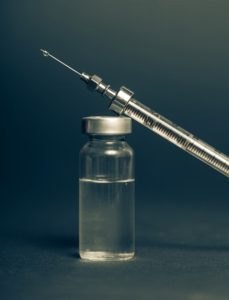 With regard to proving the affirmative defense that justifies possession of hypodermic needles without a prescription, for purposes of determining the procedure required to raise a defense and the level of proof required to establish a defense, the Code provides, for three kinds of defenses: ordinary, affirmative and reversed-burden defenses. The statute at issue with hypodermic needles is a reversed-burden defense under 2C:1-13b(2).
With regard to proving the affirmative defense that justifies possession of hypodermic needles without a prescription, for purposes of determining the procedure required to raise a defense and the level of proof required to establish a defense, the Code provides, for three kinds of defenses: ordinary, affirmative and reversed-burden defenses. The statute at issue with hypodermic needles is a reversed-burden defense under 2C:1-13b(2).
Reversed-burden defenses, as provided by subsection b(2), are those affirmative defenses which require the defendant to bear the ultimate burden of proof on some issue. That fact distinguishes them from either of the other defenses.
Such defenses now exist only where the Code specifies that the defendant bears the burden of proving a matter. However, before enactment of the Code, reversed burden defenses were occasionally judicially created.
Most reversed-burden defenses must be proved by a preponderance of the evidence. Reversed-burden defenses have the capacity to raise constitutional problems. It is clear that the defendant cannot be required to bear a burden of proof as to any defense which amounts to disproof of what is an element from a constitutional standpoint, that is, the conduct, circumstances, result and culpability which define the crime.
Most reversed-burden defenses do not raise the constitutional issue because they do not relate to matters that are constitutional elements but to matters relating to justification or excuse. As of now, the only reversed-burden defense found constitutionally infirm is that of the 1981 version of the “diminished capacity” section, 2C:4-2.
The relevant portion of the affirmative defense statute reads:
2C:1-13. Proof Beyond a Reasonable Doubt; Affirmative Defenses; Burden of Proving Fact When Not an Element of an Offense. a. No person may be convicted of an offense unless each element of such offense is proved beyond a reasonable doubt. In the absence of such proof, the innocence of the defendant is assumed.
b. Subsection a. of this section does not:
(1) Require the disproof of an affirmative defense unless and until there is evidence supporting such defense; or
(2) Apply to any defense which the code or another statute requires the defendant to prove by a preponderance of evidence or such other standard as specified in this code.
